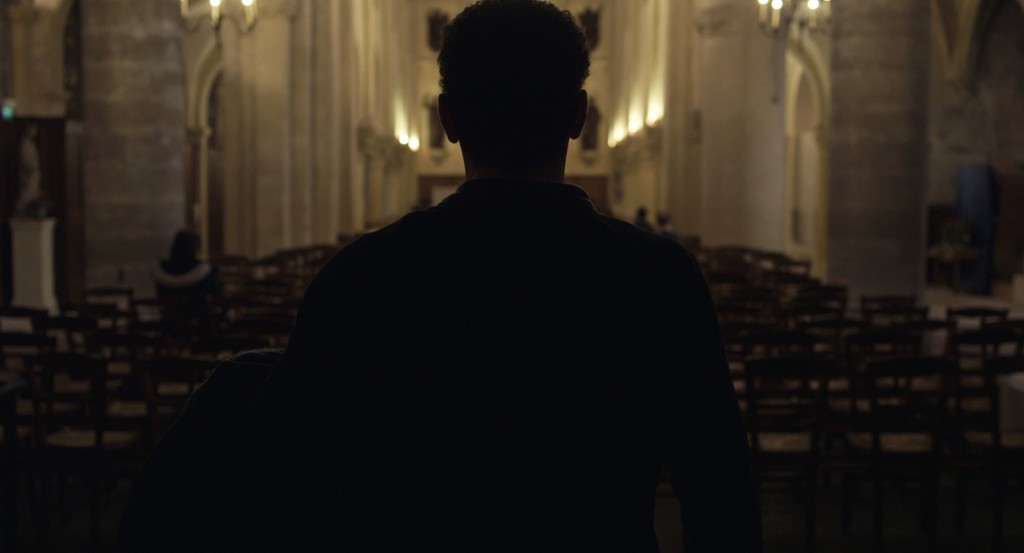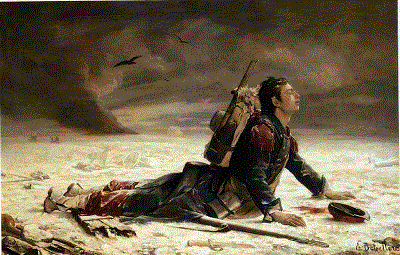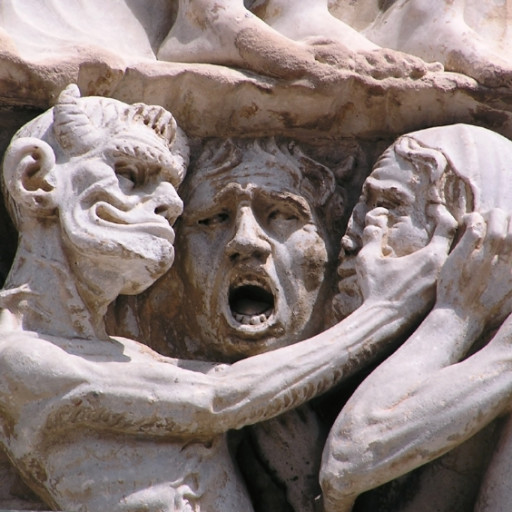"The enemy therefore limits you gives you your form and founds you". This sentence of Saint-Exupéry expresses our condition fairly well at the end of this first week of 2015. The enemy forces me to evolve according to his codes, within a space he has circumscribed. I am first prisoner. He chooses the field and is trying to stay confined to it. Of the two immutable human data, space and time, it takes me space. Remove the space in time is a bit of Laurel to Hardy. The other unit continues to live, but it is disfigured. She lost the balance offered by the otherness of her spouse. Time is not the same following the space in which it evolves. Geography performs fate with a measure as precise as the hourglass. Read the continuation of "The fate of Charlie"
Travelogue
Two thousand and fourteen years ago...
Christmas can be summed up in four letters: fiat. Before being an industrial symbol, it is the word, Mary's acceptance to the angel. This acceptance precedes any reflection. It is docility and trust in epiphany.
Four small letters like a breath but also like a feverish expectation. Thy will be done ! And may all our amens forever echo it.
Novena for France

What a great initiative! A novena for France. A novena to express our love for the Blessed Virgin and ask her to watch over our beautiful country with all the saints. It is useless to belch on social networks or on the Internet or even in the street, there is no point in belching if we do not ask the intercession of our most holy Mary for our country. If we don't do it, if this effort of prayer is not intimate and obligatory to us, then we have nothing to do with France. We feed ourselves with words. The intercession of the Blessed Virgin is the way to receive enough graces to hope that the future of our country will be worthy of its past. Never believe that our future is due to anger, agitation, side effects, whatever we do, good or bad, the future also belongs, above all, to our prayer. Never think we are enough. The acceptance of our weakness, of our lack, of the insufficiency precisely of our strength and of our will proves that divine intercession is obligatory. This acceptance marks our entry into the novena! Without knowing it, the docility linked to this acceptance, the “conformity” of our soul, allows us to enter this novena. Let us be guided when the Lord has only one deep desire: to lead his little flock. Docility is the fruit of tenderness...
One day at Pôle Emploi in 2014
Edifying history that was told to me this week ... far removed from the round effects of our leaders on the television sets. A day at Pôle Emploi for a young unemployed with a project quickly turned into an obstacle course. Read more of "One day at Pôle Emploi in 2014"
The Humanity of Cheyenne Carron — Reflections on the Film The Apostle

What amazement came over me one recent morning while listening to the voice of a young woman auscultated by Louis Daufresne in his program, The Great Witness , on Radio Notre-Dame. I was going to learn that this young woman's name is Cheyenne Carron. Christian, she directed a film, The Apostle 1 , the story of a Muslim touched by grace who decides to convert to Catholicism and has to suffer the outrages of his relatives.
Read the continuation of "The humanity of Cheyenne Carron - Reflections on the film The Apostle"
In memoriam Alvaro Mutis
It was a year ago. Alvaro Mutis joined the sky. The immense Colombian writer deserves to be read and re-read. This sparkling monarchist projected a bridge between old Europe and South America. His poems, his stories, his novels carry and carry our history through the figure of Maqroll el Gaviero, solitary sailor, disillusioned, dreaming of the Empire of Byzantium or the reign of Saint-Louis aboard old tubs close to sinking.
From traditional…
“We are dwarfs on the shoulders of giants; we see more than they, and further; not that our gaze is piercing, nor lofty in stature, but we are elevated, heightened, by their gigantic stature”.
This quote from Bernard de Chartres (12th century) found in Rémi Brague's latest book, Moderately Modern (Editions Flammarion), always strikes me as brighter each time I read it. Tradition is never what traditionalists or progressives say it is. Tradition resolutely ignores divisions. She doesn't even know confrontation. Tradition boils down to a deep sense of balance and serenity. If we dive into her, we immediately realize that she is inaccessible to most men, that few are those of whom she could be proud, that they were always armed with prodigious humility. But all those who wanted to put her in a cage because they hated her influence or those who did the same because they wanted to protect her from herself and keep her for themselves, did not understand or saw a thing. . The tradition is unalterable. Contrary to popular belief, its destruction is impossible. At worst, is it possible to forget it. And forgetting it does him no harm. She knows how to reserve herself. She is never in a hurry, panicked in the face of her time. She takes her time, since she accompanies him. If men forget her, she knows how to leave traces here and there so that we rediscover her existence when the time comes.
It is like water: no one can break it or hold it.
You should almost not refer to it. You should act as if she wasn't there. We deserve it so little… It immediately loses its luster when we talk about it, when we bring it down to our level. Tradition is intrinsically linked to life; in reality, they are one. They go together.
Which saints to turn ?
The Marcial Maciel affair forces us to ask the question of Evil. Our time avoids rubbing shoulders with it. What do we know about the work of the devil and what can we do to protect ourselves from it? After trying to hide the good in life, is it any wonder that evil comes to light? The works of the devil are innumerable, but the Holy Spirit can do everything, especially transform them.
It was necessary to have the faconde of Léon Bloy to assert: "There is only one sadness, that of not being holy". This heady question of holiness always returns like a season that does not pass. There are many things we can get rid of, but never the question of holiness is part of it. She is consubstantial to us. As soon as we see or witness something just or unfair, something related to good or evil, we are on the way to holiness. Whether towards her or against her. It takes a long time to realize how consubstantial the question of holiness is. We are holy, we are a temple, we started from the Church which is holy, we are in the image of God who is holy, and yet we are eating up, we fall, we pain, we are embedded ... so little results for so many promises. The condition of saint requires quantity of effort and gives few visible results.
Read the rest of "What saints do you have?" »
Humility News
The human vision of humility is like the human vision of love, reduced. Humility must exercise its magisterium at all times and in all places. Humility does not allow us to choose whether it should be exercised. Humility thus requires infinite availability and infinite vigilance. It requires a term which has almost disappeared from our modern language, docility. Docility has long been the cornerstone of education. Docility enclosed and guided the will by forcing it to apply itself with discernment and for the cause of a life. The docility of character requires assiduous training, like humility. Docility is the lieutenant of humility. She is also his stewardship, which is not incompatible with the rank of junior officer.
Docility is often the first step leading to availability and vigilance. Being docile requires being alert. Being docile makes life so much easier. Being docile these days is the first reaction to dictatorship in the modern world. Because docility prevents assertion and condemns narcissism. We do not imagine how docility allows us to accomplish great things.
To access humility, one must deny the ego.
What resonance can such a phrase have in our time? Denying the ego? Or, take into consideration the ego to better humiliate it? What madness ? How can we say in our time that being humbled is the surest road to humility? I remember Françoise Dolto's studies on this subject. Far from the image conveyed on Dolto by its thurifers. Dolto praising certain forms of humiliation to reach a “superior” state, a state where being detaches itself from its image; where being dominates and subjugates its image. And of course, Françoise Dolto praised this form of education in children. What was the dunce cap? What was the corner? These practices of another age as we would say today, were they not above all the possibility for the child to repent, and, to repent in front of others? There is no humiliation experienced in solitude. The ego calms down when it confronts intimacy. "I give thanks to God for never having had, because of my science, from the height of my master's chair, at any moment of my teaching activity, a movement of vain pride which raised my soul from the seat of the humility.
The surest way to holiness, that is to say the surest way to the state that is asked of us by God, is humility. Whoever utters these words showed in his life a natural humility. One day in the year 1257, when his fame could swell him with pride, Saint Thomas Aquinas, Brother Thomas therefore, is passing through a convent in Bologna. He does some service. He does not hesitate to do all kinds of tasks. He is available ; there is a liberation of the soul to be available, to bathe in docility. A monk passing through the monastery sees him and gives him the order to follow him. “The prior asks you to follow me”. Brother Thomas complies. He harnesses himself with the monk's belongings, some in the cart which he begins to drag, the rest on his back. Brother Thomas is of good constitution, but the load proves to be very heavy all the same. He works. The prior said: "Take the first brother you find". Brother Thomas appeared to the religious as the right person to help him. The monk is in a hurry, he rebuffs Brother Thomas who is struggling to carry everything and move forward at a reasonable speed. Brother Thomas shows docility in the effort, but he also shows great docility in the face of the reproaches of the religious. In town, the scene of the monk snubbing the brother is comical. People laugh at this caravan as it passes. But suddenly, a murmur runs through the crowd. It spreads like wildfire. Whisper is a name. A bourgeois insists on educating the religious. The brother you are mistreating is… The monk stiffened a little more, if that were possible. He dares not turn around. He dares not face his victim. The shadow of brother Thomas overhangs him, but this shadow has no meaning, brother Thomas does not overhang anyone with his shadow. Brother Thomas is in the back smiling, almost placid, he has had time to catch his breath. The monk approaches him and asks him to forgive him, he continues to wave the air with his arms, but this time to create intimacy with Brother Thomas, when before he had never ceased to show ostensibly the gap existing between him and this brother of small condition. He approaches him, touches his shoulder, everyone can see that there is no animosity between them, that on the contrary he breathes a form of complicity between them. Brother Thomas, dupe of nothing, actor of everything, replies to the monk who had just slipped in to him that he should have declared his identity, and instructed him of his quality, that there was no question of disobeying the prior. As the crowd kept murmuring against the monk, Brother Thomas affirmed that he was there of his own free will, that he accepted this charge without grumbling, that there was no reason to get angry with anyone. either, that obedience was the sine qua non of faith. To obey one's prior, to obey out of love for God. It costs nothing to get out of this way; the way of God's love. God's love takes on its full meaning in man's obedience. If man comes to derogate from this gentle law, nothing exists but the modern world. Without docility, without humility. Without love.
Fear news from Ernest Hello
But if from fear in general we pass to fear of Jesus Christ in the Garden of Olives, we will find silence more suitable than speech. Her passion is a series of excesses, many of which are unknown to us, says Angèle de Foligno. But these sufferings, terrible as they were, were successive, not simultaneous. In the development of the Passion, he will not carry them all at once. But in the Garden of Olives, by virtue of the same terror, they acquired in him a greater perfection than that which was about to be given to them by reality itself. Perhaps the crucifixion was felt in a more terrible way in the Garden of Olives than on the cross. For on the cross he was actually felt. In the Garden of Olives it was felt in spirit.
The sweat of blood is the word of this terror. In general the man does not sweat blood. The sweat of blood is a thing outside of everything, as the terror of Jesus Christ was outside of everything. He felt God in a rage pressing down on him, and he knew what it was to be a God in a rage.
He carried the substantial fury of God. He saw his earthly future, which was passion, then the future of men: he saw their crimes, their pains. No one knows what he saw. No one knows what he smelled. No one knows what he was wearing. No one knows with what tremor this human nature quivered, which had no other support than a divine Person, and which saw itself as the object of God's wrath.
Ernest Hello, Words of God, Reflections on some sacred texts. Editions Jerome Millon.



